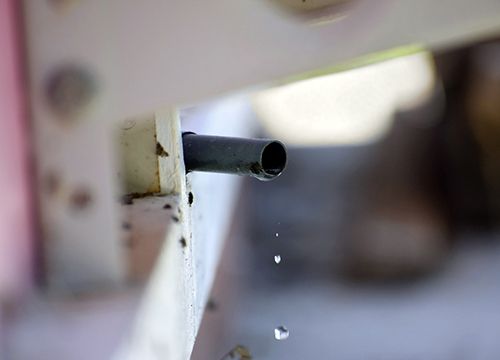Some Common Questions About AC Condensation
Learn about Your HVAC Unit
Though most of us rely on air conditioning to keep us cool in the summer months, very few people actually know how their AC units work. One of the most common issues HVAC technicians are asked about is the condensation produced by an air conditioning unit. Depending on the humidity, your AC can produce roughly between 5 and 20 gallons of water in the summer. For those not familiar with how an AC works, it can be difficult to know when this is within normal levels and when it might be an indication of something not working the way it should.
5 Common Questions and Answers About AC Condensation
To help you better understand why your AC unit produces condensation and what issues to look for, we have assembled five of the most common questions that HVAC technicians get asked. These should help you to familiarize yourself with the way the unit works and when it is the right time to book an AC service. Here are the five most common questions and their answers:
- What causes condensation? It is a common misunderstanding that all your AC unit does is cool the air it circulates through your home. In fact, a key function is also the conditioning of air to ensure your living space stays comfortable, regardless of the weather outside. Part of what makes warm weather hard to deal with is high humidity levels. So, when an AC unit is pulling air from the outdoors, it runs this air through an evaporator coil which extracts unwanted humidity. This process produces the condensation you see on your AC unit.
- What is a normal level of condensation? There is no real ‘normal’ when it comes to AC condensation. The amount is entirely dependent on the humidity levels of the air the unit is pulling in. If you are in an arid climate, expect to see very little condensation being produced. If you are in a high-humidity climate, expect to see far more condensation draining from the unit.
- Where does the condensation go? All air conditioners come with a draining system to remove condensation from the unit. Usually this comes in the form of a simple pipe which lets water flow from the system via gravity, though some units will use a pump. Before turning your AC unit on at the start of the warm season, it is a wise idea to check your drainage pipe for blockages and to make sure water is flowing to the desired location.
- What is in the condensation? Essentially, the condensation process in AC units is actually quite simple and does not alter the chemical composition of the water being produced. While it is not advisable to drink this water, many people find a way to collect run-off to use for things like watering plants or cleaning the driveway.
- When should I be worried about condensation? If you find that your AC unit is leaking or experiencing irregular water runoff even when the humidity levels outside have remained fairly steady, it may be an indication of something wrong with your unit. The causes can include a blocked condensation pipe, a degraded condensation plate, evaporator coils that are frozen or dirty, low refrigerant levels, a dirty air filter, or problems with the installation.
If you have any concerns about how your HVAC unit is functioning, be sure to book an appointment with an experienced technician in your area. Addressing problems as soon as they arise and keeping your unit regularly maintained is the best way to ensure that your AC keeps you cool throughout the summer.
Ensure your AC unit is running smoothly by consulting with the HVAC experts at Comfort Solutions. Call us at 610-438-9300 or contact us online to schedule an appointment.

Recent Posts

Zoned Heating Systems – What Are They? What Are the Advantages?

The Impact of Furnace Size on Efficiency and Comfort

How to Reduce Your Heating Bills this Winter

The Benefits of Seasonal HVAC Inspections
